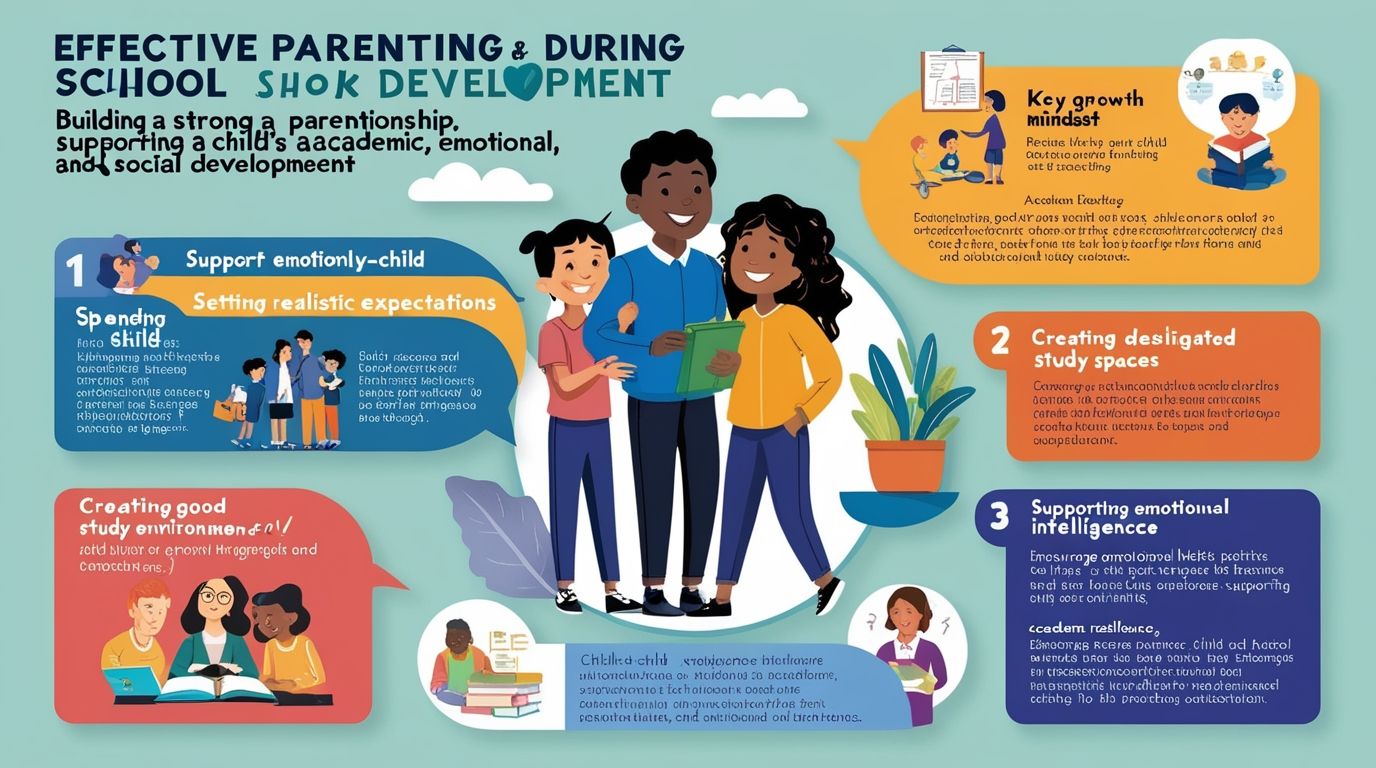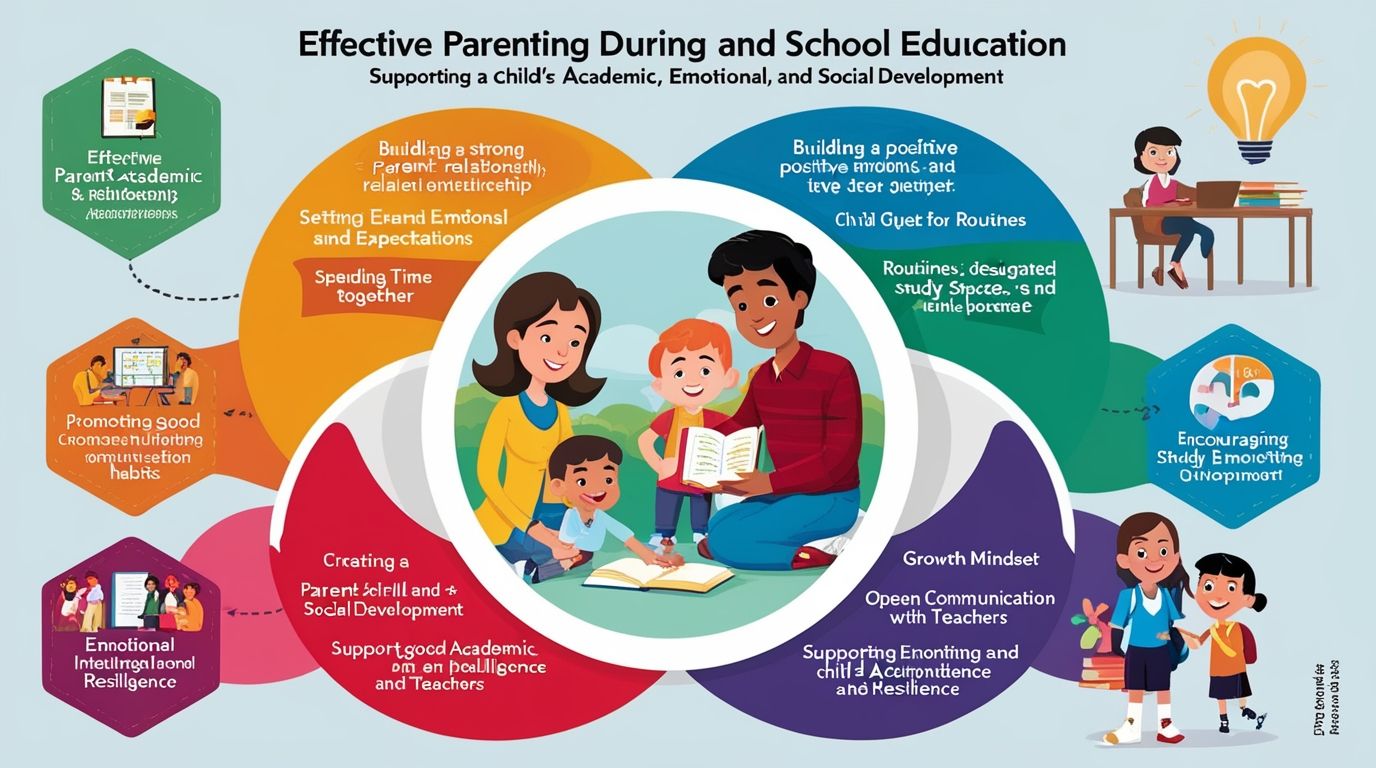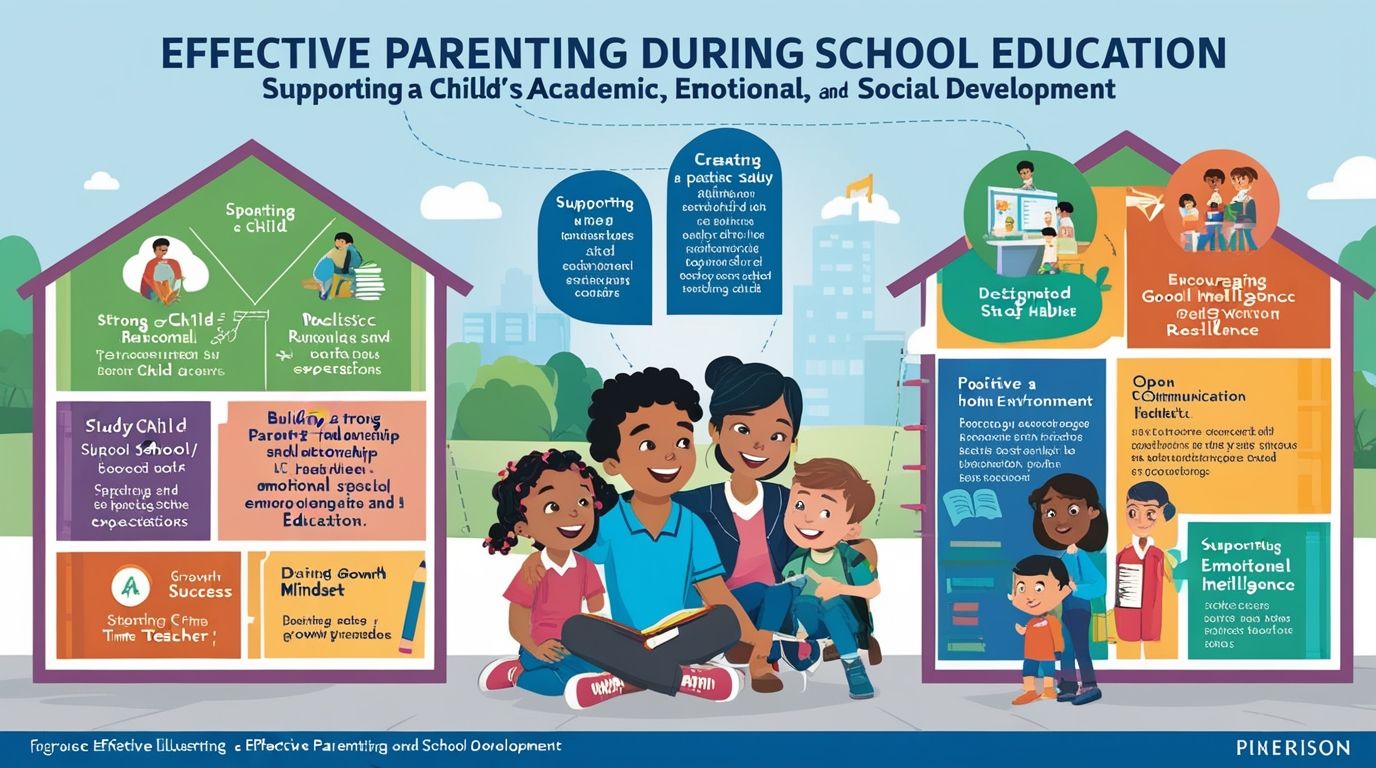Effective Parenting During School Education, Parenting plays a vital role in shaping a child’s academic success, emotional development, and overall well-being during their school years. Effective parenting during school education requires a balanced approach that fosters independence, nurtures emotional intelligence, and creates an environment conducive to learning. As children grow, their needs evolve, making it crucial for parents to adapt their strategies to support their child’s cognitive, social, and emotional development at every stage. This article will explore key principles of effective parenting during school education, focusing on building strong parent-child relationships, creating a positive home environment, promoting good study habits, and maintaining open communication with the school.
1. Building Strong Parent-Child Relationships
At the core of effective parenting is the parent-child relationship, which sets the foundation for a child’s confidence, self-esteem, and motivation to learn. A secure, supportive relationship fosters trust and allows children to feel valued, making them more likely to succeed in school.
a. Emotional Support and Encouragement
Children, especially during school education, experience a wide range of emotions, from excitement about learning new things to anxiety over tests and peer interactions. It is essential for parents to provide consistent emotional support, encouraging their children to express their feelings openly without fear of judgment. Active listening and validating emotions are critical components of this support.
For instance, if a child is struggling with a difficult subject or a friendship issue, parents can provide a non-judgmental space for them to share their concerns. This helps children develop emotional resilience, which is essential for handling academic and social challenges.
b. Spending Quality Time Together
Spending quality time together strengthens the parent-child bond and provides opportunities for parents to understand their child’s interests and challenges. Family activities such as reading together, playing educational games, or discussing school topics help reinforce academic skills while promoting a positive attitude toward learning.
c. Setting Realistic Expectations
While it’s important for parents to set high academic expectations, they must also ensure that these expectations are realistic and aligned with their child’s abilities. Unrealistic expectations can lead to stress and feelings of inadequacy, while achievable goals motivate children to put in effort and take pride in their accomplishments.

2. Creating a Positive Home Environment
A positive and supportive home environment is crucial for effective learning. The physical and emotional atmosphere at home can significantly influence a child’s ability to focus, absorb information, and manage academic challenges.
a. Establishing a Routine
Children thrive on structure, and establishing a consistent daily routine helps them develop self-discipline and time management skills. A well-planned routine includes designated time for homework, breaks, extracurricular activities, and family interactions. A predictable schedule not only reduces stress but also helps children prioritize their tasks and stay organized.
b. Designating a Study Space
Creating a quiet, distraction-free study area at home is essential for productive learning. This space should be equipped with necessary materials such as books, stationery, and a computer, depending on the child’s needs. By having a dedicated study area, children associate the space with learning and are more likely to focus on their studies.
c. Encouraging a Growth Mindset
A growth mindset, as defined by psychologist Carol Dweck, is the belief that abilities and intelligence can be developed through effort and perseverance. Parents play a key role in fostering this mindset by praising effort rather than innate ability. When children believe that they can improve through hard work, they are more likely to embrace challenges and persist in the face of difficulties.
For example, instead of saying “You’re so smart,” parents can say, “I’m proud of how hard you worked on this project.” This shift in language reinforces the idea that effort leads to success and encourages children to keep trying, even when they encounter obstacles.
3. Promoting Good Study Habits
Developing effective study habits is a critical component of academic success. Parents can guide their children in cultivating habits that enhance focus, retention, and understanding of the material.
a. Time Management and Prioritization
Teaching children how to manage their time effectively is one of the most valuable skills parents can impart. Parents can help their children break down large assignments into smaller tasks, set deadlines, and prioritize activities based on their importance and urgency. Tools such as planners or digital apps can help children stay organized and keep track of their responsibilities.
b. Encouraging Regular Review
One effective study habit is regular review of school material, rather than cramming before exams. Parents can encourage their children to review their notes, revisit key concepts, and practice problem-solving on a daily basis. This method reinforces long-term retention of information and reduces last-minute stress before tests.
c. Balancing Academics and Extracurricular Activities
While academics are important, a well-rounded education also includes extracurricular activities such as sports, music, or art. These activities help children develop social skills, creativity, and resilience. Parents should encourage their children to pursue interests outside of academics while ensuring that they maintain a healthy balance between schoolwork and leisure activities.
4. Maintaining Open Communication with the School
Effective parenting during school education extends beyond the home. Parents must maintain regular communication with teachers, school counselors, and administrators to stay informed about their child’s progress and address any potential issues early on.
a. Attending Parent-Teacher Meetings
Parent-teacher meetings are invaluable opportunities for parents to discuss their child’s academic performance, social development, and any concerns with educators. Regular attendance at these meetings helps parents stay connected with the school and provides insight into areas where their child may need additional support or encouragement.
b. Monitoring Academic Progress
Parents should keep track of their child’s grades, test scores, and feedback from teachers. Monitoring academic progress allows parents to identify patterns of improvement or struggle, enabling them to intervene if necessary. However, it is important to balance monitoring with trust, avoiding excessive pressure on the child.
c. Collaborating with Teachers
When parents and teachers work together, children benefit from a more cohesive support system. If a child is experiencing difficulty with a particular subject or behavior, parents can collaborate with teachers to create a plan that addresses the issue. Open communication ensures that parents are aware of school expectations and can reinforce these at home.

5. Supporting Emotional and Social Development
While academic achievement is important, a child’s emotional and social development is equally critical during school years. Effective parenting involves fostering a child’s emotional intelligence, social skills, and resilience.
a. Teaching Empathy and Emotional Regulation
Children who can understand and manage their emotions are better equipped to handle the social dynamics of school. Parents can teach empathy by encouraging children to consider others’ feelings and perspectives. Additionally, helping children develop emotional regulation strategies, such as deep breathing or positive self-talk, empowers them to cope with stress and frustration.
b. Promoting Positive Peer Relationships
Parents should encourage their children to build healthy relationships with peers by fostering qualities such as kindness, cooperation, and conflict resolution. Engaging in role-playing scenarios or discussing real-life social situations can help children practice these skills in a safe environment.
c. Encouraging Resilience
Resilience is the ability to bounce back from setbacks, and it is a crucial skill for success both in school and life. Parents can promote resilience by teaching children to view failures as learning opportunities. Instead of shielding children from challenges, effective parents guide them through problem-solving processes, helping them develop the confidence to overcome obstacles.
Conclusion
Effective parenting during school education involves a holistic approach that addresses the academic, emotional, and social needs of children. By building strong parent-child relationships, creating a positive home environment, promoting good study habits, maintaining open communication with the school, and supporting emotional development, parents can play a pivotal role in their child’s success. Parenting is an evolving process, and adapting these strategies to the unique needs of each child ensures that they grow into confident, resilient, and well-rounded individuals.
References
- Dweck, C. S. (2006). Mindset: The New Psychology of Success. Random House.
- Epstein, J. L. (2011). School, Family, and Community Partnerships: Preparing Educators and Improving Schools. Westview Press.
- Harris, A. L. (2013). The Broken Compass: Parental Involvement with Children’s Education. Harvard University Press.
- Pomerantz, E. M., & Moorman, E. A. (2010). Parent Involvement and Children’s Academic and Social Development in Elementary School. Child Development Perspectives, 4(3), 193-198.
- Hoover-Dempsey, K. V., & Sandler, H. M. (1997). Why Do Parents Become Involved in Their Children’s Education? Review of Educational Research, 67(1), 3-42.

11 thoughts on “Effective Parenting During School Education”
Comments are closed.